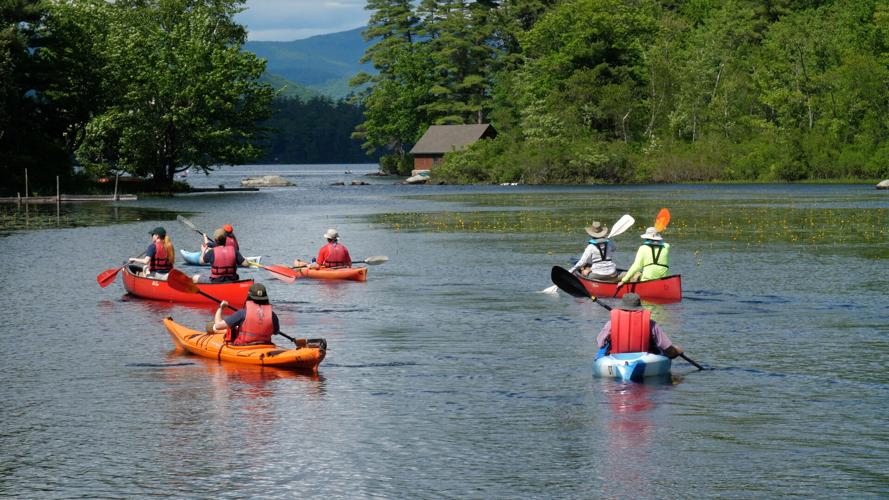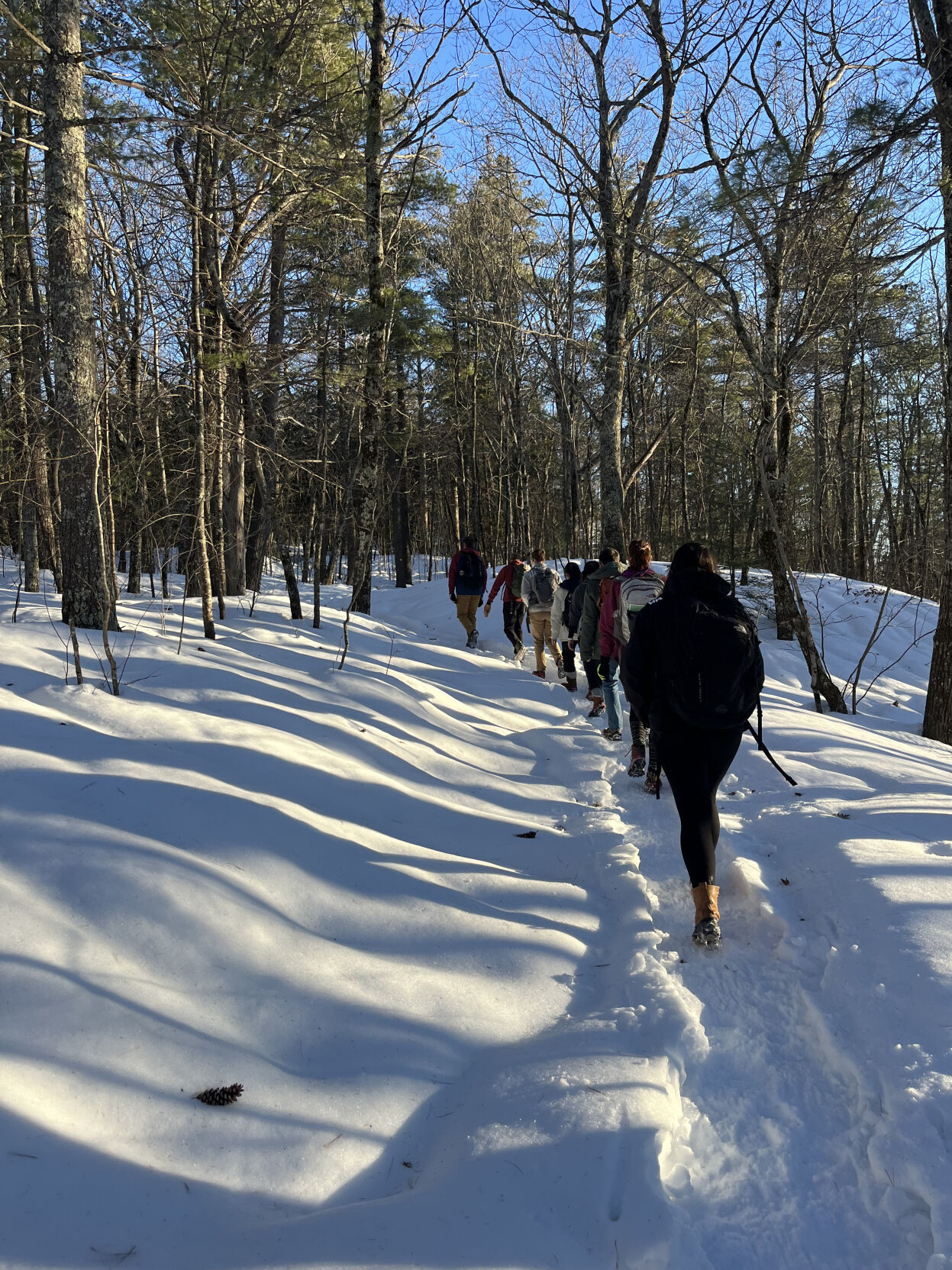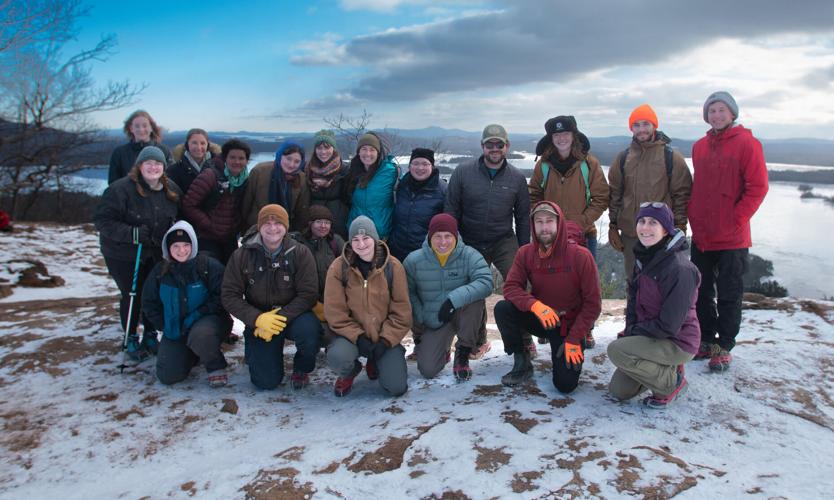HOLDERNESS — Staff at the Squam Lakes Association are working hard to maintain their conservation efforts despite the unexpected termination of the Lakes Region Conservation Corps, an AmeriCorps program, last month.
Lakes Region Conservation Corps, which was comprised of AmeriCorps volunteers and based at SLA, served several conservation organizations throughout the area. This year, they had 27 members before SLA leaders learned at the end of April the program was immediately terminated under federal regulation 2 CFR 200.341(a)(4).
AmeriCorps is an independent federal agency which engages more than 5 million Americans in service across a variety of sectors. AmeriCorps volunteers also earn a small stipend while working for nonprofits across the country.
Gretchen Stallings, executive director of Volunteer NH — the organization which operates AmeriCorps at the state level — said she received word from D.C. regarding the program’s termination on April 25. The letter, signed by Interim Agency Head Jennifer Bastress Tahmasebi, stated the AmeriCorps award to the Lakes Region Conservation Corps “no longer effectuates agency priorities”, and all federally-funded activities were ordered to cease at once.
Staff at Volunteer NH promptly notified organizations the next day.
“I want to clarify that the decision to terminate the Lakes Region Conservation Corps (LRCC) was made solely by the federal AmeriCorps agency, not by Volunteer NH,” Stallings wrote Wednesday evening in an email.
The termination of grant funding to support Lakes Region Conservation Corps is just one part of a broader action taken by AmeriCorps staff at the national level. It resulted in the immediate termination of hundreds of programs across the US.
“We understand the disruption this has caused and are committed to supporting affected members and partners,” Stallings wrote. “Volunteer NH remains proud of LRCC’s service and continues to champion national service in New Hampshire.”
But here at the local level, organizations like SLA are moving forward despite uncertainty, Executive Director EB James and AmeriCorps Program Manager Elise Eifler said Wednesday in an interview.
Staff keep up with the news and are aware of developments regarding agency funding in the U.S. at the moment, but had made changes — like changing language used in their agreements — in order to remain compliant with the new administration’s goals, and thought they were compliant. They foresaw funding issues coming down the pike in the next year, but thought they’d make it through 2025.
“Though we knew we had been scrutinized, our assumption was that we had made it through the hoops,” James said.
AmeriCorps had already been appropriated money from Congress for fiscal year 2024, which funds the program for 2025, as well as for fiscal year 2025.
“I think that added a little bit to our surprise in regards to being defunded and our grant terminated for this year,” Eifler said.
SLA is one of eight organizations which serve as hosts, but they’re in a unique position as the operators of the grant, under the auspices of the state service commission. It wasn’t the SLA which apparently did not “effectuate” the goals or priorities of the program, but the Lakes Region Conservation Corps more broadly.
But there were nine out of the 27 AmeriCorps volunteers working at the SLA site, so they’ve realized a significant impact. It’s a $500,000 budget in fiscal year 2024 for the whole Lakes Region Conservation Corps, which James characterized as “small fish” in the grand scheme of things, and the benefits received through the spending of those monies greatly outweigh the expense.
“From our perspective, it was money extremely well spent,” James said.
Lakes Region Conservation Corps isn’t a federal-direct grant program — the monies are dispersed by the state, and James said state-level funding of AmeriCorps programs may have been the target of this round of cuts.
Lakes Region Conservation Corps is a coalition of conservation organizations serving in different capacities to further efforts including education, trail work and invasive species removal. The program garners great value, it’s a 1:1 match as a federal-private partnership, meaning a donor to the SLA garners a direct match from the government. Because it was public money coming in, it afforded SLA to keep many of their programs free.
That meant launching boats, taking school kids out for educational opportunities and keeping 60 miles of trail open to the public and free to use. Staff said the public benefitted from those amenities, plus the work done to ensure good water quality like testing and milfoil removal.
James described it as a “game-changing” program for SLA — the ability to leverage private dollars to expand their efforts and impacts into lake and watershed health — and they’re hard-pressed to limit it. The whole point of the program was to increase their capacity to do this sort of work — before the AmeriCorps program, SLA worked intensively on the lake and the trails for about six weeks a year, and increased to doing that about 11 months each year.
“The power of that was pretty significant,” James said.
“We’re protecting the larger economic engine here, as well.”
At present, there’s not a clear or official pathway to restore funding for the program. The notice itself said there’s no opportunity to appeal, James explained. But, one by one, organizations are working to maintain their efforts at a high level. SLA will probably make it through, which James said may be true for many of the partner organizations, but not all.
“The board has committed to it,” James said. “We don’t know how we’re going to make it but, by gosh, we’re going to.”
Their community has felt a large impact over the last eight years from the work done by AmeriCorps volunteers. They’ve been working with the library, the schools, put on winter festivals and treat their office like a community center. In the wake of this announcement, residents have been reaching out with messages of support and concern.
“It looks like we have a lot of community support, in the near term, to try to keep something together for the year,” James said.
If you’re hiking through the Squam region on any of the trails — Rattlesnake, for example, was rebuilt almost entirely last year with AmeriCorps labor and SLA supplies — you’d be hard-pressed not to notice their impact.
“These people, they’re AmeriCorps because they’re in service to the community — they’re not doing it for the money.”




















(2) comments
if you're being paid, you're not a volunteer.
It’s not just the 27 Job Corp employees who are impacted. It’s 27 landlords who have a 12 month lease impacted as well. And families who had health insurance, and money for food. Everyone is left scrambling.
Welcome to the discussion.
Log In
Keep it Clean. Please avoid obscene, vulgar, lewd, racist or sexually-oriented language.
PLEASE TURN OFF YOUR CAPS LOCK.
Don't Threaten. Threats of harming another person will not be tolerated.
Be Truthful. Don't knowingly lie about anyone or anything.
Be Nice. No racism, sexism or any sort of -ism that is degrading to another person.
Be Proactive. Use the 'Report' link on each comment to let us know of abusive posts.
Share with Us. We'd love to hear eyewitness accounts, the history behind an article.